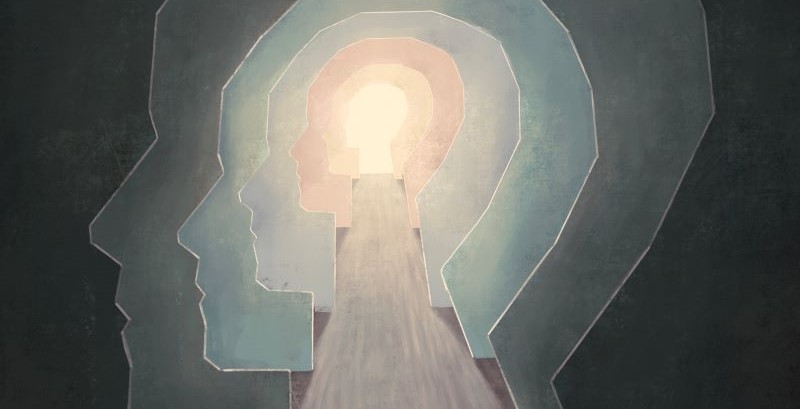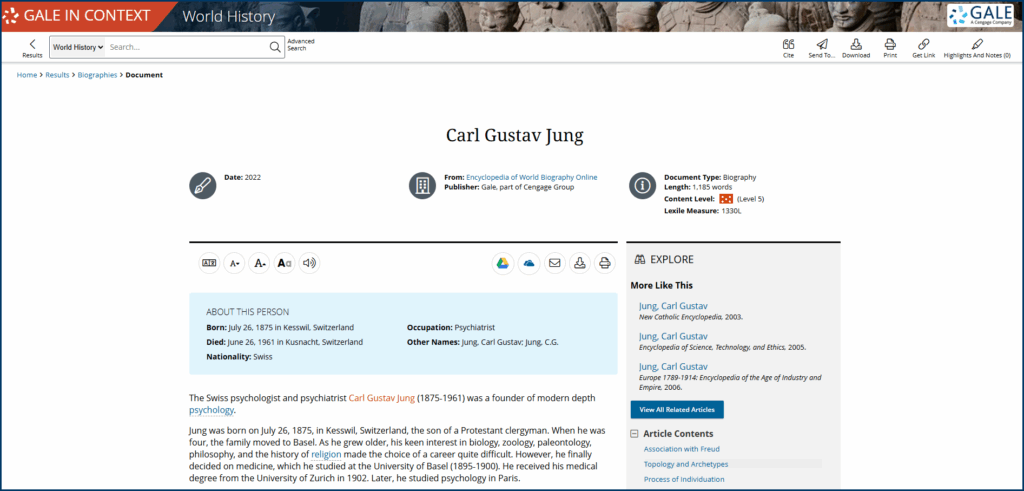As modern medicine has advanced and drugs have been developed to treat everything from depression to bipolar disorders and schizophrenia, therapy and counseling have adjusted. An emphasis on brain chemistry and different types of behavioral therapy have supplanted earlier methods of psychology. Freudian analysis, once the standard for modern psychology, is now practiced by a much smaller percentage of practitioners than in the past. Nonetheless, the history of twentieth-century psychology is fascinating, both for how different kinds of psychology developed and how psychology shaped different aspects of Western culture. One of the key contributors to this history was Carl Gustav Jung, who was born 150 years ago this week. Librarians and other educators looking to help students understand psychology and its impact on culture will find numerous resources in Gale In Context: World History.
Jung was born on July 26, 1875, in Kesswil, Switzerland. He studied medicine and then began work in 1900 at a psychiatric clinic. Three years later, he married Emma Rauschenbach, who collaborated with him in his scientific work for the rest of her life. A more prominent collaborator of Jung’s was Sigmund Freud. When Jung read Freud’s enormously influential Interpretation of Dreams, he realized that he and Freud were approaching psychology in similar ways, and Jung reached out to Freud to show him his own Studies in Word-Association, which Jung published in 1904. The two giants of psychology soon formed a friendship and began collaborating.
Although Jung and Freud were both exploring how the psyche and unconscious were related to neurosis, Jung realized in the early 1910s that Freud’s approach didn’t leave theoretical room for Jung’s ideas, which focused on how the symbols found in myths, fairy tales, and superstitions were expressed in someone’s dreams and how those could be used to understand a person’s psyche. Jung accused Freud of being too narrow and dogmatic; Freud accused Jung of being unscientific, and their partnership was fractured in 1913, with Jung forming a school of psychology known as analytic psychology.
Jung is best known for two different contributions to modern psychology. One was the distinction between extroverts and introverts. Jung’s 1921 paper “Psychological Types” discussed that now-familiar distinction in ways that might seem strange in a contemporary context, as he focused on sex (a preoccupation with sex wasn’t uncommon with early psychologists). Jung argued that because of their libidos, extroverts look for external stimulation, whereas introverts find contentment intrinsically. Jung argued that extroverts were more engaged with the real world, whereas introverts were prone to live in a world that relied more on fantasy and imagination.
Jung is even better known for his idea of the collective unconscious and the related idea of archetypes. These concepts were first introduced in Jung’s Psychology of the Unconscious in 1912 in German and 1916 in English. Jung argued that all humans share a collective unconscious, which they inherit at birth, and which forms the foundation for myths and religion. Jung based this belief on his experience with patients and their dreams, and how often those dreams resembled ancient myths and fairy tales, and how those stories were similar across cultures.
Archetypes were a key aspect of this unconscious, which is why such constructs as the hero, the sage, and the shadow can be found in almost every culture. Jung’s research led him to work among the Pueblo in the United States as well as other Indigenous peoples in Kenya, Egypt, and India. He also studied various religions, focusing on their symbols and how they seemed to be connected to a person’s psyche. Jung’s ideas on archetypes would go on to have an enormous influence on the work of writers such as Joseph Campbell and others who explored how archetypal symbols and motifs are expressed in stories. Campbell’s work would provide the foundation for George Lucas’s Star Wars movies, and screenwriters and teachers of screenwriting have been mining those theories ever since.
Jung had to give up his psychological practice in 1944 after suffering a heart attack. Emma died in 1955, and he died in 1961. Although Jung’s influence in psychology has faded in the twenty-first century, his impact on culture persists.
About the Author
J. Robert Parks is a former professor and frequent contributor to Gale In Context: U.S. History and Gale In Context: World History who enjoys thinking about how our understanding of history affects and reflects contemporary culture.



